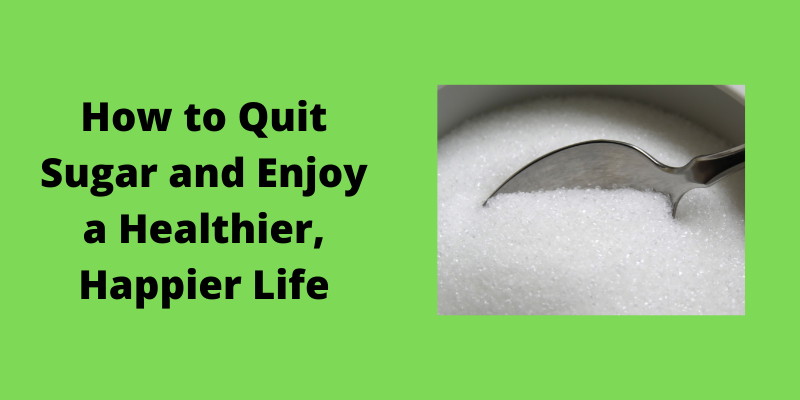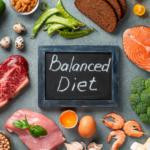How to Quit Sugar and Enjoy a Healthier, Happier Life
Want to know how to quit sugar out of your diet? Sugar addiction is a serious problem. We offer the best advice on how to quit sugar for good!

How To Quit Sugar Introduction
Are you struggling to quit sugar? If so, you’re not alone, as the average American eats about 150 pounds of sugar every year. In fact, many foods and beverages are full of hidden sugar that we don’t even realize we’re consuming, everything from low-fat yogurt to fruit juice to kids’ cereals contain high amounts of refined sugar.
It can be tough to give up something so widely used in the food industry, but by cutting back on sugar, you can dramatically improve your health and enjoy life more.
Is Sugar Really That Bad?
It’s no secret that sugar is everywhere these days. In fact, most American adults consume more than 15% of their daily calories from added sugars. That’s almost 300 empty calories per day (based on a 2,000-calorie diet). If you have diabetes or any other type of metabolic disorder, then those numbers jump even higher.
But what is sugar exactly? It’s basically any carbohydrate that has been added in order to make food taste sweet, even though it has little nutritional value. Sweeteners are great at providing taste and texture, but they do very little else.
Quitting Sugar Doesn’t Mean Quitting Everything Sweet
You’ll still be able to enjoy plenty of desserts in your new life as a sugar-free human being. You just have to find healthier alternatives. There are plenty of low-sugar treats that can serve as an adequate replacement for old favorites like candy bars and fudge brownies, sweet potato fries dipped in almond butter, for example.
If you can’t imagine ever giving up your morning coffee sweetened with sugar packets, try swapping out those empty calories for yogurt sweetened with honey or maple syrup instead. Be creative. (As long as you don’t use artificial sweeteners, you want those bad boys out of your diet.) Do whatever it takes to slowly but surely make sugarless treats more appealing than their sugary counterparts.
Start Slowly
The biggest mistake you can make when quitting sugar is thinking it’s going to be easy. It won’t be. But that doesn’t mean it can’t be done. Research shows that people who completely eliminate sugar tend to binge-eat more than those who don’t, it’s not just about what you’re eating but also how you’re eating.
Start by eliminating added sugars from your diet for two weeks. After two weeks, if you feel like you’ve got a handle on your cravings, then try cutting out all processed foods (including bread) for another two weeks. Once those two weeks are up, slowly reintroduce foods back into your diet one at a time, even if they contain sugar and pay attention to how your body reacts.
If you notice any physical or emotional changes after consuming something with added sugars in it, then cut that food out of your diet once again until things return to normal.
Wean Yourself Off Processed Foods
The key to quitting sugar is making sure you’re eating real food as often as possible. On its own, sugar can be hard to detect in processed foods. But if you look closely at ingredient lists (or search for high fructose corn syrup on ingredients lists) you’ll be able to see what kind of sugar your food is made with.

If it comes from a plant like beets or honey (the most natural sources), don’t worry about it. If it comes from a word that ends in -ose, steer clear. By reading labels and avoiding processed foods, you’ll make it easier to quit sugar altogether.
Balance Your Diet
A sugar detox isn’t really necessary; most people quit sugar when they clean up their diet. The first step is to avoid sugary drinks by switching to water or unsweetened tea. If you’re having trouble kicking your habit of ordering soda whenever you eat out, try asking for water or soda water with lemon (which has less sugar than juice).
Instead of packaged or processed foods high in sugar, opt for fresh vegetables, whole grains like quinoa and wild rice, lean proteins like chicken breast and seafood and free-range eggs. While it might take some time for your taste buds to adjust (you may need more seasoning at first), after about a week you should notice that sweet food doesn’t taste as sweet as it used to.
Exercise Regularly
A majority of Americans aren’t getting enough exercise. In fact, about half of us get no exercise at all. And if you think sitting will help offset your sweet tooth, think again: People who sit for more than six hours a day have five times as much visceral fat around their abdomens as those who spend just one hour per day watching TV.

According to Dr. Barbara Levine, We need to be moving in order to regulate our metabolism so we are burning calories 24 hours a day and not storing them in our body’s fat cells. So get off your duff.
Talk To People About How You Feel
There’s a reason why so many people have trouble making changes. As humans, we’re just not wired for drastic change. That’s because it usually triggers an uncomfortable fight-or-flight response. What do you normally do when confronted with adversity?
Do you run from it or face it head on? Both tactics are valid and can help, but if your body is gearing up for fight-or-flight every time you consider quitting sugar (your greatest adversary), it won’t take long for your efforts to fizzle out.
In order to quit sugar effectively, you need to find another way to deal with change that doesn’t make you feel like fleeing from your challenges at every turn.
How To Quit Sugar Conclusion
In 2015, sugar-sweetened beverages accounted for 74% of all added sugar consumed by Americans. And recent research is showing that when people replace sugary drinks with water or unsweetened coffee or tea they lower their calorie intake significantly. If you’re trying to lose weight or if you’re just looking for a way to improve your overall health—you may want to give up sugary drinks once and for all.
Even if you’re not trying to lose weight, replacing soda with water may have other benefits like helping control blood pressure in people who are at risk of developing hypertension (high blood pressure). The bottom line: It doesn’t take much effort or time to make an improvement on your diet.


